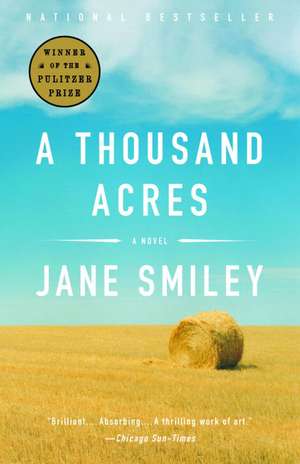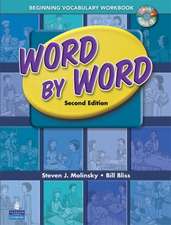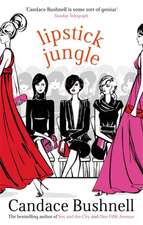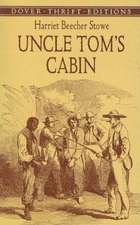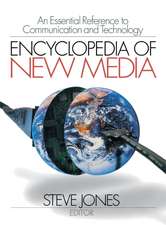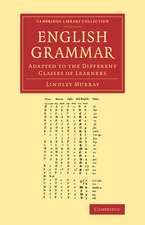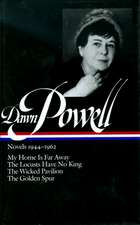A Thousand Acres
Autor Jane Smileyen Limba Engleză Paperback – 30 noi 2003
Vezi toate premiile Carte premiată
| Toate formatele și edițiile | Preț | Express |
|---|---|---|
| Paperback (1) | 98.78 lei 3-5 săpt. | |
| Anchor Books – 30 noi 2003 | 98.78 lei 3-5 săpt. | |
| Hardback (1) | 74.61 lei 24-35 zile | +34.00 lei 4-10 zile |
| EVERYMAN – mar 2018 | 74.61 lei 24-35 zile | +34.00 lei 4-10 zile |
Preț: 98.78 lei
Nou
Puncte Express: 148
Preț estimativ în valută:
18.90€ • 20.53$ • 15.88£
18.90€ • 20.53$ • 15.88£
Carte disponibilă
Livrare economică 01-15 aprilie
Preluare comenzi: 021 569.72.76
Specificații
ISBN-13: 9781400033836
ISBN-10: 1400033837
Pagini: 384
Dimensiuni: 130 x 208 x 22 mm
Greutate: 0.3 kg
Ediția:Anchor Books.
Editura: Anchor Books
ISBN-10: 1400033837
Pagini: 384
Dimensiuni: 130 x 208 x 22 mm
Greutate: 0.3 kg
Ediția:Anchor Books.
Editura: Anchor Books
Notă biografică
Jane Smiley is the author of more than ten works of fiction, including Good Faith, Horse Heaven, Moo, and The Greenlanders. In 2001 she was inducted into the American Academy of Arts and Letters. She lives in northern California.
Extras
At sixty miles per hour, you could pass our farm in a minute, on County Road 686, which ran due north into the T intersection at Cabot Street Road. Cabot Street Road was really just another country blacktop, except that five miles west it ran into and out of the town of Cabot. On the western edge of Cabot, it became Zebulon County Scenic Highway, and ran for three miles along the curve of the Zebulon River, before the river turned south and the Scenic continued west into Pike. The T intersection of CR 686 perched on a little rise, a rise nearly as imperceptible as the bump in the center of an inexpensive plate.
From that bump, the earth was unquestionably flat, the sky unquestionably domed, and it seemed to me when I was a child in school, learning about Columbus, that in spite of what my teacher said, ancient cultures might have been onto something. No globe or map fully convinced me that Zebulon County was not the center of the universe. Certainly, Zebulon County, where the earth was flat, was one spot where a sphere (a seed, a rubber ball, a ballbearing) must come to perfect rest and once at rest must send a taproot downward into the ten-foot-thick topsoil.
Because the intersection was on this tiny rise, you could see our buildings, a mile distant, at the southern edge of the farm. A mile to the east, you could see three silos that marked the northeastern corner, and if you raked your gaze from the silos to the house and barn, then back again, you would take in the immensity of the piece of land my father owned, six hundred forty acres, a whole section, paid for, no encumbrances, as flat and fertile, black, friable, and exposed as any piece of land on the face of the earth.
If you looked west from the intersection, you saw no sign of anything remotely scenic in the distance. That was because the Zebulon River had cut down through topsoil and limestone, and made its pretty course a valley below the level of the surrounding farmlands. Nor, except at night, did you see any sign of Cabot. You saw only this, two sets of farm buildings surrounded by fields. In the nearer set lived the Ericsons, who had daughters the ages of my sister Rose and myself, and in the farther set lived the Clarks, whose sons, Loren and Jess, were in grammar school when we were in junior high. Harold Clark was my father's best friend. He had five hundred acres and no mortgage. The Ericsons had three hundred seventy acres and a mortgage.
Acreage and financing were facts as basic as the name and gender in Zebulon County. Harold Clark and my father used to argue at our kitchen table about who should get the Ericson land when they finally lost their mortgage. I was aware of this whenever I played with Ruthie Ericson, whenever my mother, my sister Rose, and I went over to help can garden produce, whenever Mrs. Ericson brought over some pies or doughnuts, whenever my father loaned Mr. Ericson a tool, whenever we ate Sunday dinner in the Ericson's kitchen. I recognized the justice of Harold Clark's opinion that the Ericson' land was on his side of the road, but even so, I thought it should be us. For one thing, Dinah Ericson's bedroom had a window seat in the closet that I coveted. For another, I thought it appropriate and desirable that the great circle of the flat earth spreading out from the T intersection of County Road 686 and Cabot Street be ours. A thousand acres. It was that simple.
It was 1951 and I was eight when I saw the farm and the future in this way. That was the year my father bought his first car, a Buick sedan with prickly gray velvet seats, so rounded and slick that it was easy to slide off the backseat into the footwell when we went over a stiff bump or around a sharp corner. That was also the year my sister Caroline was born, which was undoubtedly the reason my father bought the car. The Ericson Children and the Clark children continued to ride in the back of the farm pickup, but the Cook children kicked their toes against a front seat and stared out the back windows, nicely protected from the dust. The car was the exact measure of six hundred forty acres compared to three hundred or five hundred.
In spite of the price of gasoline, we took a lot of rides that year, something farmers rarely do, and my father never again did after Caroline was born. For me, it was a pleasure like a secret hoard of coins--Rose, whom I adored, sitting against me in the hot musty velvet luxury of the car's interior, the click of the gravel on its undercarriage, the sensation of the car swimming in the rutted road, the farms passing every minute, reduced from vastness to insignificance by our speed; the unaccustomed sense of leisure; most important, though, the reassuring note of my father's and mother's voices commenting on what they saw--he on the progress of the yearly work and the condition of the animals in the pastures, she on the look and size of the house and garden, the colors of the buildings. Their tones of voice were unhurried and self-confident, complacent with the knowledge that the work at our place was farther along, the buildings at our place more imposing and better cared for. When I think of them now, I think how they had probably seen nearly as little of the world as I had by that time. But when I listened to their duet then, I nestled into the certainty of the way, through the repeated comparisons, our farm and our lives seemed secure and good.
From that bump, the earth was unquestionably flat, the sky unquestionably domed, and it seemed to me when I was a child in school, learning about Columbus, that in spite of what my teacher said, ancient cultures might have been onto something. No globe or map fully convinced me that Zebulon County was not the center of the universe. Certainly, Zebulon County, where the earth was flat, was one spot where a sphere (a seed, a rubber ball, a ballbearing) must come to perfect rest and once at rest must send a taproot downward into the ten-foot-thick topsoil.
Because the intersection was on this tiny rise, you could see our buildings, a mile distant, at the southern edge of the farm. A mile to the east, you could see three silos that marked the northeastern corner, and if you raked your gaze from the silos to the house and barn, then back again, you would take in the immensity of the piece of land my father owned, six hundred forty acres, a whole section, paid for, no encumbrances, as flat and fertile, black, friable, and exposed as any piece of land on the face of the earth.
If you looked west from the intersection, you saw no sign of anything remotely scenic in the distance. That was because the Zebulon River had cut down through topsoil and limestone, and made its pretty course a valley below the level of the surrounding farmlands. Nor, except at night, did you see any sign of Cabot. You saw only this, two sets of farm buildings surrounded by fields. In the nearer set lived the Ericsons, who had daughters the ages of my sister Rose and myself, and in the farther set lived the Clarks, whose sons, Loren and Jess, were in grammar school when we were in junior high. Harold Clark was my father's best friend. He had five hundred acres and no mortgage. The Ericsons had three hundred seventy acres and a mortgage.
Acreage and financing were facts as basic as the name and gender in Zebulon County. Harold Clark and my father used to argue at our kitchen table about who should get the Ericson land when they finally lost their mortgage. I was aware of this whenever I played with Ruthie Ericson, whenever my mother, my sister Rose, and I went over to help can garden produce, whenever Mrs. Ericson brought over some pies or doughnuts, whenever my father loaned Mr. Ericson a tool, whenever we ate Sunday dinner in the Ericson's kitchen. I recognized the justice of Harold Clark's opinion that the Ericson' land was on his side of the road, but even so, I thought it should be us. For one thing, Dinah Ericson's bedroom had a window seat in the closet that I coveted. For another, I thought it appropriate and desirable that the great circle of the flat earth spreading out from the T intersection of County Road 686 and Cabot Street be ours. A thousand acres. It was that simple.
It was 1951 and I was eight when I saw the farm and the future in this way. That was the year my father bought his first car, a Buick sedan with prickly gray velvet seats, so rounded and slick that it was easy to slide off the backseat into the footwell when we went over a stiff bump or around a sharp corner. That was also the year my sister Caroline was born, which was undoubtedly the reason my father bought the car. The Ericson Children and the Clark children continued to ride in the back of the farm pickup, but the Cook children kicked their toes against a front seat and stared out the back windows, nicely protected from the dust. The car was the exact measure of six hundred forty acres compared to three hundred or five hundred.
In spite of the price of gasoline, we took a lot of rides that year, something farmers rarely do, and my father never again did after Caroline was born. For me, it was a pleasure like a secret hoard of coins--Rose, whom I adored, sitting against me in the hot musty velvet luxury of the car's interior, the click of the gravel on its undercarriage, the sensation of the car swimming in the rutted road, the farms passing every minute, reduced from vastness to insignificance by our speed; the unaccustomed sense of leisure; most important, though, the reassuring note of my father's and mother's voices commenting on what they saw--he on the progress of the yearly work and the condition of the animals in the pastures, she on the look and size of the house and garden, the colors of the buildings. Their tones of voice were unhurried and self-confident, complacent with the knowledge that the work at our place was farther along, the buildings at our place more imposing and better cared for. When I think of them now, I think how they had probably seen nearly as little of the world as I had by that time. But when I listened to their duet then, I nestled into the certainty of the way, through the repeated comparisons, our farm and our lives seemed secure and good.
Recenzii
“Brilliant. . . . Absorbing. . . . A thrilling work of art.” —Chicago Sun-Times
“A family portrait that is also a near-epic investigation into the broad landscape, the thousand dark acres of the human heart. . . . The book has all the stark brutality of a Shakespearean tragedy.” —The Washington Post Book World
“Powerful and poignant.” —The New York Times Book Review
“Superb. . . . There seems to be nothing Smiley can’t write about fabulously well.” —San Francisco Chronicle
“It has been a long time since a novel so surprised me with its power to haunt. . . . A Thousand Acres [has] the prismatic quality of the greatest art.” —Chicago Tribune
“Absorbing. . . . Exhilarating. . . . An engrossing piece of fiction.” —Time
“A full, commanding novel. . . . A story bound and tethered to a lonely road in the Midwest, but drawn from a universal source. . . . Profoundly American.” —The Boston Globe
“A family portrait that is also a near-epic investigation into the broad landscape, the thousand dark acres of the human heart. . . . The book has all the stark brutality of a Shakespearean tragedy.” —The Washington Post Book World
“Powerful and poignant.” —The New York Times Book Review
“Superb. . . . There seems to be nothing Smiley can’t write about fabulously well.” —San Francisco Chronicle
“It has been a long time since a novel so surprised me with its power to haunt. . . . A Thousand Acres [has] the prismatic quality of the greatest art.” —Chicago Tribune
“Absorbing. . . . Exhilarating. . . . An engrossing piece of fiction.” —Time
“A full, commanding novel. . . . A story bound and tethered to a lonely road in the Midwest, but drawn from a universal source. . . . Profoundly American.” —The Boston Globe
Descriere
Descriere de la o altă ediție sau format:
This powerful twentieth-century reimagining of Shakespeare's King Lear centers on a wealthy Iowa farmer who decides to divide his farm among his three daughters. Ambitiously conceived and stunningly written, A Thousand Acres spins the most fundamental themes of truth, justice, love, and pride into a universally acclaimed masterpiece.
This powerful twentieth-century reimagining of Shakespeare's King Lear centers on a wealthy Iowa farmer who decides to divide his farm among his three daughters. Ambitiously conceived and stunningly written, A Thousand Acres spins the most fundamental themes of truth, justice, love, and pride into a universally acclaimed masterpiece.
Premii
- National Book Critics Circle Award Winner, 1991
